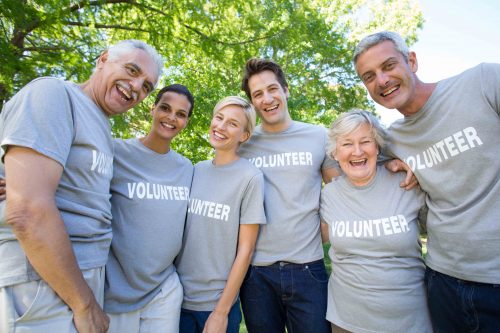 Over recent times, lots of us have been thinking about what we can do to support our communities. But while volunteering can positively impact on the people around us, it’s important to remember that it can have meaningful benefits for our wellbeing, too. Taking part in voluntary work is a great way of helping others but here’s how it could help you, too.
Over recent times, lots of us have been thinking about what we can do to support our communities. But while volunteering can positively impact on the people around us, it’s important to remember that it can have meaningful benefits for our wellbeing, too. Taking part in voluntary work is a great way of helping others but here’s how it could help you, too.
Volunteering can help you make friends, learn new skills, advance your career, and even feel happier and healthier!
Volunteering connects you to others
One of the more well-known benefits of volunteering is the impact on the community. Volunteering allows you to connect to your community and make it a better place. Even helping out with the smallest tasks can make a real difference to the lives of people and the delivery of much needed services by local groups. And volunteering is a two-way street: It can benefit you and your family as much as the cause you choose to help. Dedicating your time helps you make new friends, expand your network, and boost your social skills.
Volunteering is a great way to meet new people, especially if you are new to an area. It strengthens your ties to the community and broadens your support network, exposing you to people with common interests, neighbourhood resources and fun and fulfilling activities.
Volunteering builds self-confidence and self-esteem
Doing good for others and the community helps to create a natural sense of accomplishment. And working as a volunteer can also give you a sense of pride and identity, helping to boost your self-confidence further by taking you out of your natural comfort zone and environment.
Volunteering is important for physical and mental health
Volunteering provides many benefits to both mental and physical health. Volunteering helps counteract the effects of stress, anger and anxiety. The social contact aspect of helping and working with others can have a profound effect on your overall psychological well-being. Nothing relieves stress better than a meaningful connection to another person.
Volunteering boosts mental health simply because it makes you happier; the so-called ‘helper’s high’. Human beings are hard-wired to give to others, and by measuring so-called brain activity and happiness hormones, researchers have found that being helpful to others can deliver great pleasure.
A growing body of evidence suggests that people who give their time to others might benefit from lower blood pressure (hypertension) and a longer lifespan compared to non-volunteers. Hypertension is an important indicator of health as it contributes to stroke, heart disease and premature death.
 Volunteering helps you forget your own problems
Volunteering helps you forget your own problems
One benefit of volunteering is that focusing on others can give us a deeper sense of perspective and help distract from negative thoughts and help stop rumination. Volunteering often involves helping those in need and can be useful in showing us that, in fact our own lives are not as bad as we thought they were.
Volunteering is important for your career
In an increasingly competitive job market, volunteering experience can be incredibly useful. It shows potential employers that you can take the initiative and that you’re willing to give your own time to improve the world for other people.
Furthermore, volunteering gives you the opportunity to practice important common skills used in the workplace, such as communication, teamwork, problem solving, planning and organization. Indeed, if you haven’t had a full-time job before then volunteering is an essential way to prove your skills when you do go for work interviews.
Conclusions: the importance of volunteering
It’s clear the benefits of volunteering are huge – improved mental and physical health, new friends and avoiding loneliness, a sense of purpose and deeper self-confidence. In turn, all of these things will help to boost your overall happiness: a win-win situation for all involved.
Communities in Transition Capacity Building Programme (North Belfast) is providing increased opportunities for local people in New Lodge & Ardoyne to avail of volunteering opportunities with local community & voluntary groups. For further information contact: paul.henry@ashtoncentre.com
